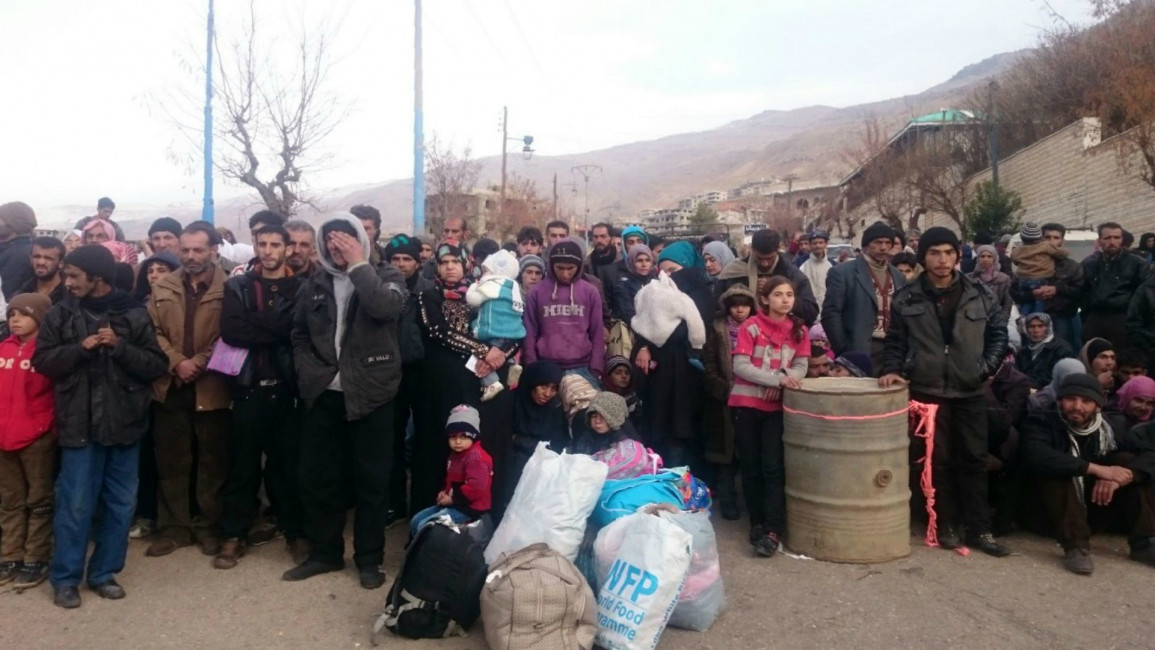
Food intervention: drop food not bombs
As aid filters into the Syrian town of Madaya, where at least 28 people have already starved to death, with thousands more living under the same risk, some might be tempted to think of this as a disaster averted, but if only that were the case. The UN-provided food will only last for a few weeks and then, once again, the people of Madaya’s lives will be in the hands of those perpetrating this cruel siege, namely the regime of Bashar al-Assad and his allies Hezbollah.
It’s of course important that the cause of the people of Madaya managed to garner support and media coverage from around the world, but the political conditions that surround it still remain firmly in place. The siege hasn’t been broken at all – it has been momentarily lifted by a regime whose motives towards Syrians who dare oppose them are encapsulated by a piece of graffiti its forces left on a wall outside Madaya that simply read ‘Kneel or Starve’.
The international political response to Madaya was characterised by the ineffectiveness of the UN as well as the indifference of the so-called ‘Friends of Syria’, who are all directly involved in military action in Syria against the Islamic State group (IS). They kept to their mandate of completely ignoring and co-existing with the far larger crimes of the Assad regime. None of them lifted a finger to help, despite having a presence in Syria’s skies.
This is surely a perfect opportunity for progressives to make the case for, as the campaign started by the Syria Solidarity Movement (SSM) have termed it, ‘food not bombs’ to be dropped to the people of Syria. The campaign calls for the Royal Air Force (RAF), which is part of the anti-IS coalition, to airdrop food into Madaya.
Last month when the British government laid out the case for involvement in the coalition, one of the most widely celebrated speeches in favour of the air strikes was delivered by the Labour Party’s Hilary Benn, who appealed to notions of internationalism and anti-fascism in the wake of the Paris attacks, but what good are these principles if they’re only applied selectively? The ‘anti-fascism’ of Hillary Benn would have the RAF ignore the mini-Auschwitzes being created by Assad and its allies in towns such as Madaya, while they focus solely on ineffective air strikes against IS.
Benn’s ‘anti-fascism’ is conditional on the proximity of the threat to Europe - blood on the streets of Paris is worth much more than the skeletal corpses of Madaya or any other of the millions of Syrians whose lives have been destroyed by the Assad and his allies. The ‘anti-fascists’ who cheered as Benn made his speech in favour of air strikes seem to be struck dumb in the face of crimes committed by Bashar al-Assad.
Then there’s the other side – the so-called peaceniks, notably the leader of Labour and the opposition, Jeremy Corbyn, who led the opposition to the air strikes. Surely now is the moment that this self-identified leftist would be able to hold the government to account for its selective action against the lesser evil of Daesh in contrast to its indifference to the greater evil of Assad? But, as with almost anything concerning the crimes of Assad, Corbyn and his supporters remain silent.
Not only would airdrops of food to the people of Madaya be a humanitarian act, but it would also be a political one. It would effectively break the siege by taking the power out of Assad hands peacefully. The UN supplies that have made it through to Madaya were only allowed through by Assad and only because the media picked up on it. If not for this, as with the various other sieges that Assad has imposed and is currently imposing on millions of civilians in Syria, the emaciated corpses would’ve gone largely unnoticed – part of the day-to-day realities of Assad’s war, tacitly accepted by the international community.
This ought to be natural territory for progressives – to penetrate this indifference to suffering, not just in terms of humanitarianism but also politically. This is the raison d’etre behind the SSM campaign, centred on a petition to force this issue to be debated in parliament. If Jeremy Corbyn took up this cause the petition could well be unnecessary. There are numerous ways Corbyn could force a debate on this issue in parliament, including challenging Cameron directly, but this is clearly not a cause Corbyn sees worth fighting.
One might ask why Corbyn remains silent? The best way to answer this would be to briefly look at his previous stances and political affiliations on issues related to Syria. When the moment came for Corbyn to oppose British military intervention against IS, Mr Corbyn and his supporters could’ve quite easily made a progressive case against the air strikes, one that was both logistically sound and morally unassailable. He could’ve made the case that despite his rhetoric about 70,000 anti-IS fighters Cameron hasn’t lifted a finger to aid them.
Corbyn could have seized upon the chance to make the case that the best way to defeat IS was to boost the progressive forces that have fought IS, but are primarily seeking to destroy the greater evil of Assad. We got none of this from the Corbyn leadership; instead we got scepticism about the existence of the Syrian rebels or insinuations that they were actually the same as IS. Most tellingly, Corbyn chose Patrick Cockburn, a man who has openly called for Britain to ally with Assad and smears the rebels as ‘al-Qaeda’, to brief Labour MPs before the vote.
Then there is the fact that Mr Corbyn is himself an open supporter of Assad’s main patron Iran, while he has long been associated with the Stop the War Coalition, which has perpetuated pro-Assad narratives and hosted numerous pro-Assad voices. There are some within the Corbyn camp who would equate the call for the RAF to open up lifelines to starving people with 2003 invasion of Iraq, while they’d support Russia’s intervention as an apparent counter to ‘Western intervention’. The actual victims of Assad and Russia don’t stand a chance – everything is seen within the lens of opposition to the West, which makes ignoring these victims virtuous.
His stance on Syria is evident of the wider reality that the formally left-wing political forces around the world are as wedded to conservative understandings of the world as many of the forces considered to be of the right. Corbyn’s claims of internationalism and anti-fascism are as selective and as meaningless as those of Hilary Benn. The dichotomy in the UK parliament between, on the one hand, the imperialistic indifference of Cameron and, on the other, the conservative, dogmatic isolationism of Corbyn can be applied more widely to the political forces of the world at large to account for how the situation in Syria has passed into the realms of near-genocide.
What’s often missed is that these two allegedly opposite forces converge over Syria. When in a few weeks the people of Madaya once again face starvation, I expect Cameron to maintain his cruel indifference, while Corbyn maintains his craven silence.
Opinions expressed in this article remain those of the author and do not necessarily represent those of The New Arab, its editorial board or staff.




